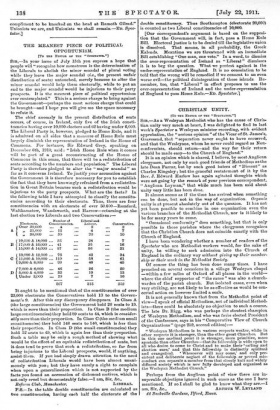THE MEANEST PIECE OF POLITICAL OPPORTUNISM.
[To TII2 Erma or TuBersesArea.1 STR,—In your issue of July 15th you express a hope that people will "recognize how monstrous is the determination of the Liberals to abolish the minor scandal of plural voting while they leave the major scandal (i.e., the present unfair distribution of seats) untouched, merely because to alter the minor scandal would help them electorally, while to put an end to the major scandal would be injurious to their party prospects. It is the meanest piece of political opportunism ever contemplated." This is a serious charge to bring against the Government—perhaps the most serious charge that could be brought—and I hope you will give me the space necessary to refute it.
The chief anomaly in the present distribution of seats occurs, of course, in Ireland, only five of the Irish consti- tuencies having over 10,000 electors and 62 having under 6,000. The Liberal Party is, however, pledged to Home Rule, and it is admitted on all sides that a measure of Home Rule must largely diminish the representation of Ireland in the House of Commons. For instance, Sir Edward Grey, speaking on December 6th, 1910, said "Irish Home Rule when it comes will be part of a great reconstructing of the House of Commons in this sense, that there will be a redistribution of seats according to the numbers and population." The Liberal Party is therefore pledged to alter the "major scandal" so far as it concerns Ireland. To justify your accusation against the Government it is therefore necessary for you to establish the fact that they have knowingly refrained from a redistribu- tion in Great Britain because such a redistribution would be injurious to the party prospects. What are the facts? In the following table I have attempted to classify the constitu- encies according to their electorate. Thus, there are four constituencies with an electorate of over 30.000—Romford, Walthamstow, Wandsworth, and Harrow—returning at the last election two Liberals and two Conservatives :—
Electorate. Number of Constituencies.
Liberal and labour.
Conservative.
Over 30,000
2
2 & „ 25,000 ... 11
4
7
20,000 ... 30 ••• 20
•••
10
19,000 & 18,000 ... 35
..• 28 ••• '7
B 117,000& 16,000
... 41
•••
25 ••• 16 15,000 & 14,000 ... 57 ••• 36 • .• 21
13,000 & 12,000 ... • .. 42 • .• 34
C 1
11,000 & 10,000 ... 119 • .. 68 .•• 61
9,000 & 8,000 ... 93 ••• 48 • .. 45
D {7,000 & 6,000 5,000 & 4,000
... 46 ... 32 ••• 26 19 ••• ••• 20 13
Under 3,000
••• 23 •••
7
••• 16
567
315
252
It ought to be mentioned that of the constituencies of over 23,000 electorate the Conservatives hold 13 to the Govern- ment's 9. After this any discrepancy disappears. In Class A (the large constituencies) the Government hold 26 seats to 19, which is more than their proportion. In Class B (the medium large constituencies) they hold 89 seats to 44, which is consider- ably more than their proportion. In Class C (the medium small constituencies) they hold 148 seats to 140, which is less than their proportion. In Class D (the small constituencies) they hold 52 seats to 4.9, which is again less than their proportion. Such a table may be only a rough method of showing what would be the effect of an equitable redistribution of seats, but it does tend to prove that such a redistribution, so far from being injurious to the Liberal prospects, would, if anything, :waist them. If you bad simply drawn attention to the need of redistribution Liberals would have been almost unani- mously with you ; but they have surely a right to complain when upon a generalization which is not supported by the facts you found an accusation of dishonest motives, which is not only cruel but demonstrably false.—I am, Sir, &c., Reform, Club, Manchester. LIBERAL. P.S.—In the table doable constituencies are calculated as two constituencies, having each half the electorate of the
double constituency. Thus Southampton (electorate 20,000) is counted as two Liberal constituencies of 10,000.
[Our correspondent's argument is based on the supposi- tion that the Government will, in fact, pass a Home Rule Bill. Electoral justice is to be denied till the legislative union is dissolved. That means, in all probability, the Greek Kalends. Meantime we are threatened with an immediate Bill establishing "One man, one vote." In a word, to dismiss the over-representation of Ireland as " Liberal " dismisses it is to beg the question. What we protest against is the under-representation of England. It is no consolation to be told that the wrong will be remedied if we consent to an even worse evil—the political disintegration of these islands. Re- member, too, that "Liberal" in effect proposes to use the over-representation of Ireland and the under-representation of England to pass Home Rule.—ED. Spectator.1






































 Previous page
Previous page